New collective company agreement at Nordea 2020-23
As a member, you take part in ensuring that the collective agreement in the financial sector remains one of the best in Denmark.
Following negotiations in a good, open, constructive and curious dialogue, Nordea and Finansforbundet in Nordea (FiN) have reached agreement on the conclusion of a new collective company agreement (in Danish: Virksomhedsoverenskomst - VOK) that will extend well into the future.
During the negotiations, FiN used the input received from membership surveys and meetings with members and union representatives.
Our mandate included the following issues, among others:
- Salary
- New salary system – which must be fair and transparent
- Focus on well-being and health and safety at work
- Flexibility
- Strengthening internal mobility
- Focus on skills enhancement
We have attained most of our objectives in this respect.
Read the news article: Big yes to the new company agreement
Læs om virksomhedsoverenskomsten på dansk
Click to get directly to the content you want to read about
An agreement extending well into the future
Collective company agreement and standard collective agreement
Salary increases in the period
New salary model – Nordea Løn (Nordea Salary)
Transferred from standard collective agreement (STOK)
Time off for special groups and on-call duty staff
All-inclusive salary with independent work planning
An agreement extending well into the future
With corona being the back cloth, your new collective company agreement was negotiated during the latest months.
It went on with mutual respect for rolls and interests and with the wish for Nordea to continue being an attractive workplace for present as well as future colleagues.
We have gained a result, economic as well as social, we can declare ourselves satisfied with. After trying for several years, we finally agreed on a new salary model and an interim arrangement from old to new, applying this year.
Before starting the negotiations, we gathered input from you as members – to be certain that we fought for those items you find most important. Increased salary is always a top scorer in that kind of surveys, and it was also important for you that more colleagues can benefit from our local salary pool. We succeeded with both. Over the next three years our combined result of the collective bargaining process is an increase of 6,6% - which is 0.6% above the 6.0% increase that employees covered by the standard collective agreement in the financial sector will be paid during the period. At the same time, a lot more colleagues will get a share of the pool for individual salary increases. Whilst the amount was around 20% in the old salary system, we estimate that the new salary model, Nordea Løn (Nordea Salary), will do at least half – probably even a lot more – good.
It has been a wide agreement that the old salary model was outdated. It didn’t any longer serve the demands one rightly could have. With Nordea Løn, we have a both fair and transparent salary model. It has been crucial to us that Nordea Løn can be the foundation on which employees and managers have trust, understand and feel safe to use.
A good result of the collective bargaining process is more than salary. Likewise, it is based on members’ wishes that we gained improvements regarding well-being, flexibility and mobility.
Over the years, our collective agreements have secured us i.e. extra days off, care days, higher pension payment, more flexibility, dental insurance and better opportunities for skill development. We feel that we with this result have gained an agreement extending into the future.
Now, it is up to you, after reading through this information and/or through a dialogue with your local shop steward, whether you can vote YES to the result.
We recommend YES.
Dorrit Brandt
President of Finansforbundet in Nordea

Click to get to the table of contents
Collective company agreement and standard collective agreement
In the spring of 2020, Finansforbundet (The Financial Services Union Denmark) concluded an agreement with the Danish Employers' Association for the Financial Sector (FA) on a standard collective agreement (in Danish: Standardoverenskomst - STOK) applying to the financial area. It was adopted by the members of Finansforbundet in March.
More information about the STOK is available here
After the STOK was in place, Finansforbundet in Nordea (FiN) and Nordea embarked on negotiations for the collective company agreement (in Danish: Virksomhedsoverenskomst - VOK), which builds on the STOK.
Because Nordea is such a large company, it is necessary to agree on terms and conditions that are more targeted at Nordea and Nordea’s employees than those provided in the STOK, which sets out the overall framework.
The new STOK and VOK are valid for a period of three years from 1 April 2020 to 31 March 2023.
Over the years, collective agreements have secured decent employment rights and working conditions for employees because many members have joined forces to demand something better. The strength lies in the community.
Throughout the years, collective agreements have brought us numerous improvements, including:
- 1997: Five care days
- 2003: Paternity leave. Part-time work for parents of small children. Health insurance. Increased holiday supplement of 0.15%. 100% pension contribution in connection with part-time employment for seniors.
- 2008: Day off on the Friday after Ascension Day. Time off in connection with sick children. Flexible working hours. An extended notice period of one month for employees aged 50 or over who have at least 12 years of seniority.
- 2014: Financial Skills Pool (Finanskompetencepuljen)
- 2017: Dental insurance
Click to get to the table of contents
Salary increases in the period
The combined result of the collective bargaining process, as provided for in the collective company agreement (in Danish: Virksomhedsoverenskomst - VOK), is an increase in salaries of 6.6% over three years.
The salary increases for 2020-23 are summarised in the following table:
| General increases | 2020 | 2021 | 2022 | Total |
| Total | 2.0% | 1.65% | 1.65% | 5.30% |
| Pool for individual increases | 2020 | 2021 | 2022 | Total |
| From the VOK framework | 0 | 0.35% | 0.35% | 0.60% |
| Nordea’s contribution | 0 | 0.25% | 0.25% | 0.50% |
| Backflow from system allowances etc. | 0 | 0.05% | 0.05% | 0.10% |
| Total | 0 | 0.65% | 0.65% | 1.30% |
| General increases AND pool for individual increases | 2020 | 2021 | 2022 | Total |
| Total | 2.0% | 2.0% | 2.30% | 6.60% |
The combined result of the collective bargaining process for Nordea employees for the 2020-23 period therefore ends at 6.60%, which is 0.6% above the 6.0% increase that employees covered by the standard collective agreement (STOK) in the financial sector will be paid during the period.
All salary increases – whether general or those from the pool – will be allocated on 1 July of the year in question. We explain in the section on Nordea Løn (Nordea Salary) below how the individual pools are going to be used in 2021 and 2022.
Explaining the numbers
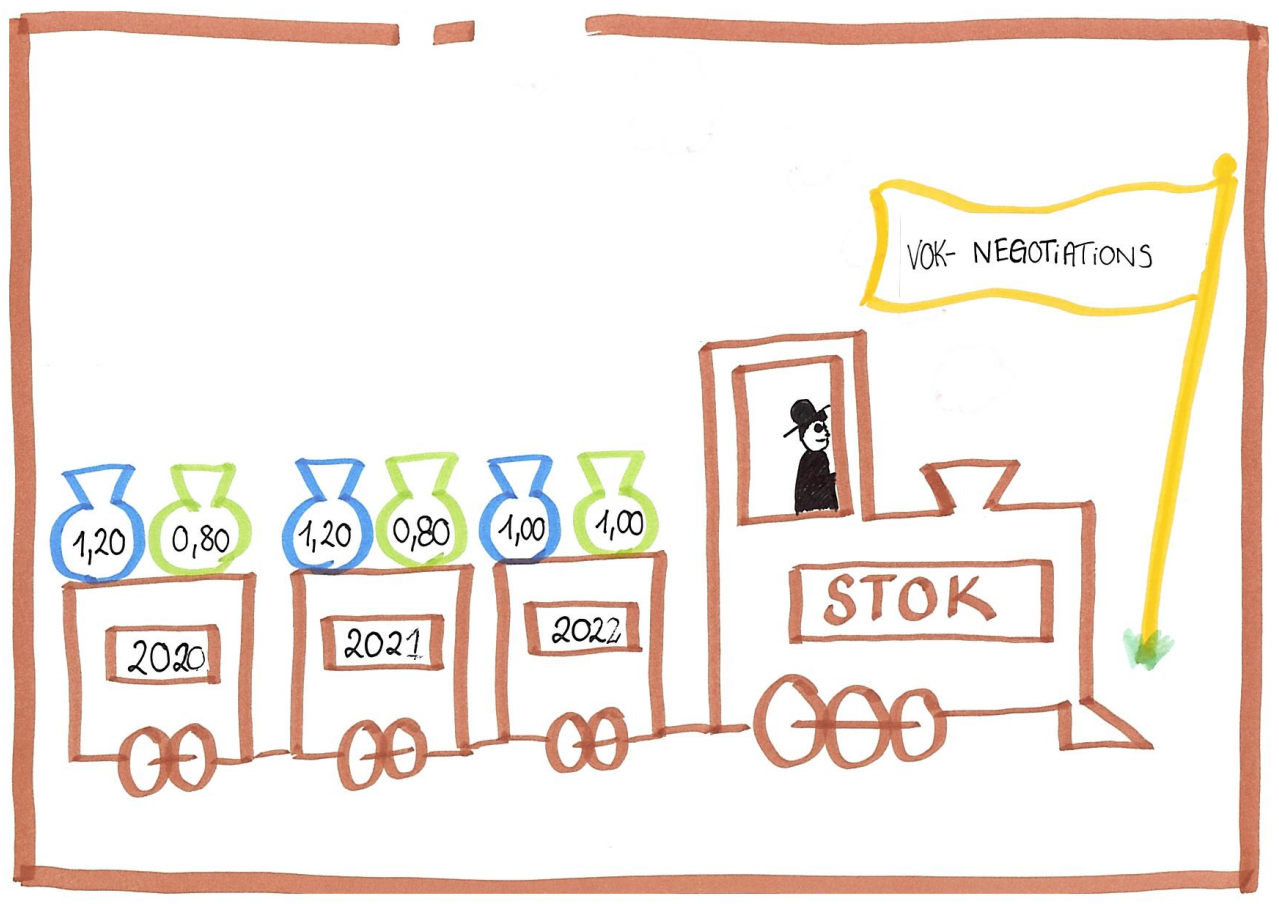

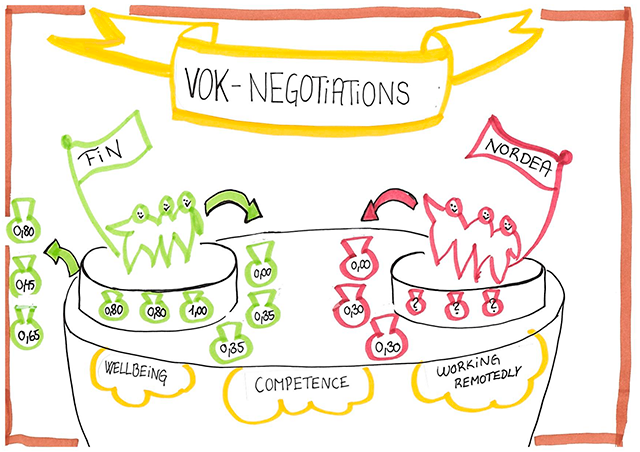
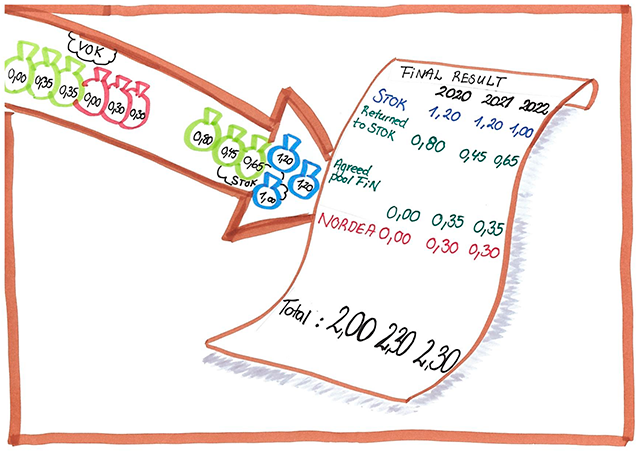
Standard collective agreement
The percentages already earmarked for general salary increases in the standard collective agreement (STOK) between the Finansforbundet (The Financial Services Union Denmark) and the Danish Employers' Association for the Financial Sector (FA) are: 1.2% in 2020, 1.2% in 2021 and 1.0% in 2022.
The VOK framework
The VOK framework is the part of the central result of the collective bargaining process that has been made available for application in the collective company agreement (VOK): 0.8% in 2020, 0.8% in 2021 and 1.0% in 2022.
FiN and Nordea have agreed, through negotiations, on how much of the VOK framework is to be spent on additional general salary increases and how much is to be dedicated to the pool for individual salary increases.
Since Nordea is switching to a new salary model and needs time for its implementation, we at FiN agree with Nordea that there will be no pool for individual salary increases in 2020. Instead, the full 0.8% that had been committed has been earmarked for general salary increases.
Nordea Løn (Nordea Salary) will be fully implemented in 2021 and 2022, and a pool for individual salary increases will therefore be available in both years.
In 2021 we have 0.8% available – of which 0.45% will go to general salary increases. The remaining 0.35% will go to the salary pool = the individual salary increases.
In 2022 we have 1.0% available – of which 0.65% will go to general salary increases. The remaining 0.35% will go to the salary pool = the individual salary increases.
Nordea’s contribution
Nordea’s contribution is the extra percentage we achieve from having a collective company agreement and which Nordea, during the negotiations, has chosen to contribute to the pool for individual salary increases.
There is no pool for individual salary increases in 2020 (when everyone will be paid the general 2.0%), but in 2021 and 2022 Nordea will contribute 0.30% (0.25% per year plus 0.05%, which is a backflow from system allowances etc.).
Click to get to the table of contents
New salary model – Nordea Løn (Nordea Salary)
Nordea Løn (Nordea Salary), as the new salary model is called, will be introduced and implemented during the autumn of 2020. The principles of Nordea Løn will be applied in the PLD where the employee and manager have a dialogue about target fulfilment from the past year – typically in Q1. The conclusion will then provide the basis for the salary dialogue – which will again translate into the actual salary adjustment as of 1 July – the first time in 2021.
Nordea and FiN have agreed to launch implementation activities to ensure that managers, union representatives and employees know and understand the model.
Objective and principles of Nordea Løn
The objective clause of Nordea Løn reads as follows: “… to create an open and transparent salary structure where the salary of the individual employee can be justified in relation to responsibility, job complexity, competencies, performance, compliance with corporate values and market level in terms of salaries.”
This means in practice that all salary bands will be measured against the benchmark (i.e. comparable jobs) – and that employees are then assessed within their own salary band in relation to how they meet the requirements and targets agreed. This applies to both “WHAT” and “HOW”.
More employees to benefit from the pool
It has been important to FiN that more employees should be able to benefit from the salary pool than the approximately 20% who benefited each year under the old model. This objective has been met in Nordea Løn as we estimate that at least 50% (probably more) will benefit from the pool in the years ahead. Furthermore, it will be possible to benefit from the pool for two or more consecutive years to a higher degree than before under the old model.
Performance assessment
Like the current model, Nordea Løn is based on an assessment of the individual employee’s performance. Instead of using a separate scale from 1 to 7, however, the salary will be determined on the basis of the targets set by the individual employee together with his or her manager in the PLD.*
This means that the targets the employee and manager set at the beginning of the year – and assess the fulfilment of when the year has passed – will determine how the salary adjustment will be as of 1 July. And therefore all targets must be SMART * – so as to ensure that it is absolutely clear whether they have been met… and how.
The principles for promoting and evaluating performance are set out on this page * As can be seen, you may be assessed as being “in line with” (meet), “above” (exceed), or “below” (below) the expected level of a person in the type of job you hold.
* Links to Nordea Intra – requires access from Nordea PC
If you perform below expectations, an action plan must be drawn up to identify what efforts you can make – with the assistance of your manager and, if relevant, other co-workers – to attain the “meet” level.
The effect of performance assessment on your salary
The salary band will in future be divided into three parts… low, medium and high. This implies that all employees can be placed in a 3x3 table – where the x-axis reflects the salary level and the y-axis reflects performance. See the table below (click here for full size).
Your performance and position in the salary band form the basis for your expected salary increase.
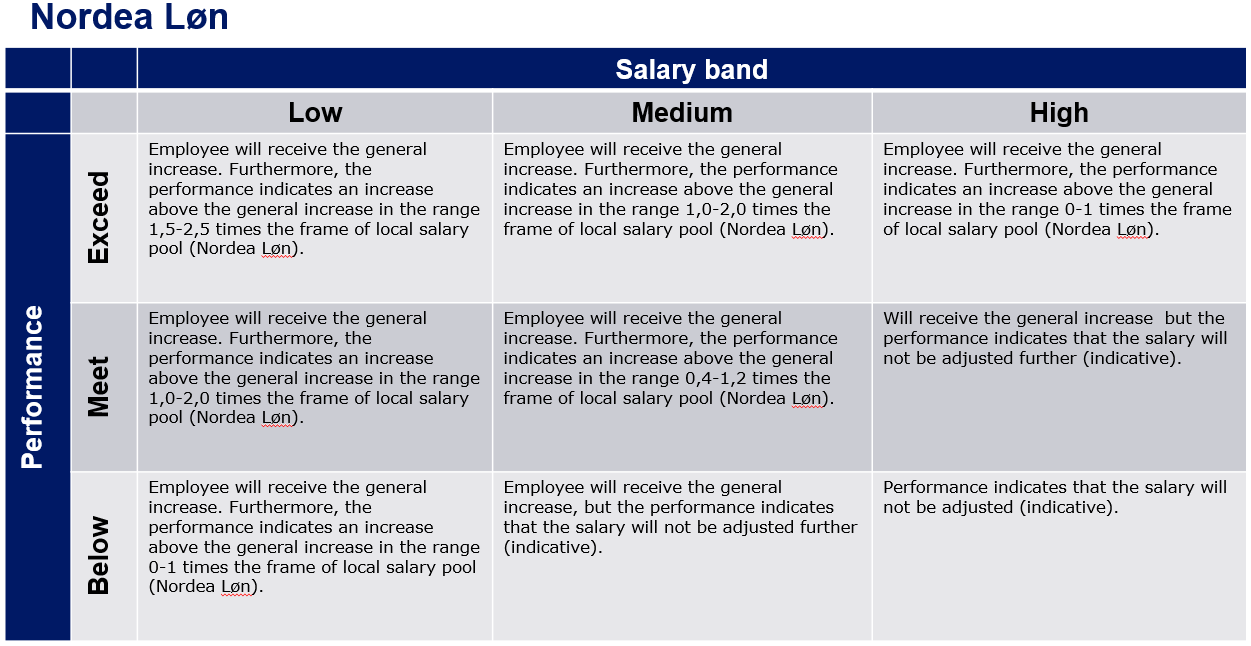
The table explains the expected adjustment of your salary – depending on your performance and current salary. An indicative range is stated, within which the adjustment will typically be.
As you can see, a very large number of employees can expect to receive a share of the pool – in addition to the general salary increase.
Example 1:
You are assessed to be in the middle – in terms of both performance and salary band. You can expect the following salary adjustment as of 1 July 2021:
General increase: 1.65%
An additional salary increase of 0.4-1.2 times the agreed pool, which will be 0.65% in 2021.
So the total salary increase will be between 1.91% and 2.43%.
Example 2:
You are in the high salary band, and your performance exceeds expectations. You can expect the following salary adjustment as of 1 July 2021:
General increase: 1.65%
An additional salary increase of 0-1 times the agreed pool, which will be 0.65% in 2021.
So the total salary increase will be between 1.65% and 2.3%.
Example 3:
You are in the high salary band, but your performance is below expectations. You will not receive any salary adjustment, neither a general increase nor from pool funds.
This is the same as today when the employee scores markedly lower than what is warranted by his or her salary. In both the current salary system and Nordea Løn, it is possible to bring the employee to a standstill in terms of salary, so that has not changed. What is new is that an action plan must now be prepared for how the employee can move up to the “Meet” level, and the assessment must be made once a year where system allowances have typically existed for several years.
Below is an illustration of what the three examples given above cover:
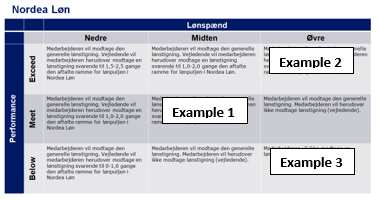
The placement of new employees is based on expectations
It has been the case that new employees were placed at the bottom of a salary band and the department salary pool was subsequently spent to move them up. The consequence of this was that, very rarely, were there any funds for offering more experienced employees a salary increase even if their scores so warranted. This has now been clarified. We agree with Nordea that the placement must be based on where an employee is expected to be within a reasonable period of time.
If you disagree with your manager
The rules on management of disagreement have not changed. If you and your manager do not agree about your performance and/or salary adjustment, you can go to your union representative – ultimately the matter may be escalated to the Salary Committee.
The Salary Committee keeps a watchful eye
To ensure that Nordea Løn is up to date at all times, that the salary bands and benchmarks match, that the salary model is applied correctly and – not least – that managers and union representatives are proactively informed of and trained in the salary model, a Salary Committee will be set up in line with earlier practice. Nordea and FiN have the same number of representatives on the committee.
One of the greatest tasks facing the Salary Committee during the period until 2021 is to ensure that Nordea Løn is well described and implemented everywhere at the bank so that all employees covered by the model see it as transparent and understandable. This implementation will also apply to managers with Danish employees at foreign offices.
Click to get to the table of contents
Transferred from standard collective agreement (STOK)
Minimum salary
As from 1 July 2021, the minimum salary for a full-time employee will be DKK 25,000, not including Nordea’s pension contribution (DKK 25,500 in 2022). The provision has been taken directly from the standard collective agreement (in Danish: Standardoverenskomst - STOK).
Care hours
In future, care hours will be deposited in the time bank when earned – the first time in January 2021. The provision has been taken directly from the standard collective agreement.
The sixth holiday week will be deposited in the time bank
The sixth holiday week will be deposited in the time bank – with effect from 1 September 2021. The provision has been taken directly from the standard collective agreement.
Student workers
Student workers will switch to a sixth holiday week and additional work. The provision has been taken directly from the standard collective agreement and takes effect on 1 July 2021.
Switch from overtime work to additional work
Compensation is payable to employees previously having been entitled to payment for overtime work in connection with the switch to payment for additional work. The provision has been taken directly from the standard collective agreement.
Limit on individual contract of employment
The limit for employees who are employed on individual contracts (of significance to care days etc.) is now fixed as an amount in Danish kroner – DKK 71,500 as of 1 July 2021 – instead of salary grades under the collective agreement as these no longer exist in the standard collective agreement.
Click to get to the table of contents
Time off for special groups and on-call duty staff
Accompaniment of close relatives who are ill
The two days off for accompaniment of close relatives who are ill may now also be taken in the event of death in the immediate family (own family and members of the family of spouse/cohabiting partner in lineal descent and at the same level). The age limit for children has been deleted, which means that an employee can always accompany his or her child – regardless of age.
Part-time work for parents of small children
The full period of part-time employment for parents of small children has been increased from not more than 12 months to not more than 18 months and may be split into not more than four periods of not less than three months.
Part-time employment for seniors
It has been agreed that, in future, a more flexible framework for the use of part-time employment for seniors will be possible. For example, the hours may be pooled into whole weeks – placed at special times of the year etc.
Return after long-term illness
Nordea has stated that it will look at initiatives aimed at communicating the knowledge of the internal tools made available and simplifying the approval process.
On-call duty
When planning on-call duty shifts, the manager must pay due consideration to the employee’s possibilities of being available.
Finansforbundet in Nordea (FiN) will be notified when an agreement on more than 40 on-call duty shifts or 480 on-call duty hours per year has been concluded and in the event that the number of shifts/hours exceeds the limits. The limit has been reduced from the current 80 shifts/960 hours.
Click to get to the table of contents
All-inclusive salary with independent work planning
All-inclusive salary (in Danish: Jobløn) is a new concept introduced in the standard collective agreement adopted in the spring, and it will also be applied in the collective company agreement at Nordea with effect from 1 July 2021.
What is all-inclusive salary?
All-inclusive salary means that the employee receives a fixed salary – and is not entitled to payment for overtime/additional work – and a supplement for working odd hours, but is expected to plan the work and working hours per week/year to match an annual standard.
It has been agreed that abuse may not take place and that the manager and employee regularly discuss whether a correlation exists between duties and working hours.
Who can switch to all-inclusive salary?
Employees receiving a monthly salary of more than DKK 53,000, not including the employer’s pension contribution, who, subject to a more detailed assessment, hold a job with independent work planning, can switch to all-inclusive salary.
Independent work planning means, for instance, that Nordea does need to impose fixed working start and finish times – and that attendance at daily meetings is not compulsory.
During the autumn of 2020, Nordea will perform a large-scale analysis to assess which job functions will come into play. Finansforbundet in Nordea (FiN) will be part of reference groups for the work.
Current employees are compensated for lost payment for overtime work
Employees who were employed at 1 July 2020 and switch to all-inclusive salary will be covered by a transitional provision so that the payment for overtime work etc. earned for the past two years will be converted into a supplement to the employee’s salary. In this way, the employee will receive a future monthly salary that, in round figures, corresponds to what he/she previously received, including payment for overtime work.
Click to get to the table of contents
Other focus areas
Well-being
A well-being committee will be set up for the purposes of supporting and promoting well-being at Nordea. The committee will also be implementing the recommendations, initiatives and measures originating in the central well-being committee set up by the Danish Employers' Association for the Financial Sector (FA) and Finansforbundet (The Financial Services Union Denmark).
The committee will be made up of representatives from Nordea and Finansforbundet in Nordea (FiN) and set up as a sub-committee of the Consultative Committee (in Danish: Samarbejdsudvalg – SU).
Skills
Skills enhancement is important to both Nordea and its employees, and it is crucial to ensure broad awareness of existing and future offers of skills enhancement.
The work originates in the Consultative Committee (SU), and working groups may be set up as and when needed with representatives from both parties to identify, clarify and/or implement solutions to different problems related to skills enhancement.
Homeworking
A working group will be set up by the end of 2020 with representatives from Nordea and FiN for the purpose of addressing the future possibilities of homeworking at Nordea.
Central issues: Flexibility, security, health and safety at work, insurance and tax implications.
Nordea must be given the opportunity to assess and draw conclusions from the experience from Covid-19 in regard to homeworking, including well-being, operations, IT security, etc.
If the parties agree, a local agreement may be concluded on the terms of future homeworking.
Job rotation
A working group will be set up to increase the possibilities of internal mobility, including the possibilities of job rotation, and implement an actual job rotation scheme.
The work will commence on 1 October 2020. Activities will be launched during the term of the collective agreement.





